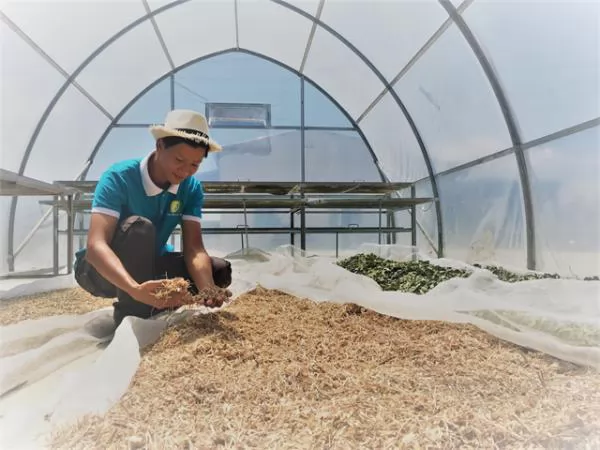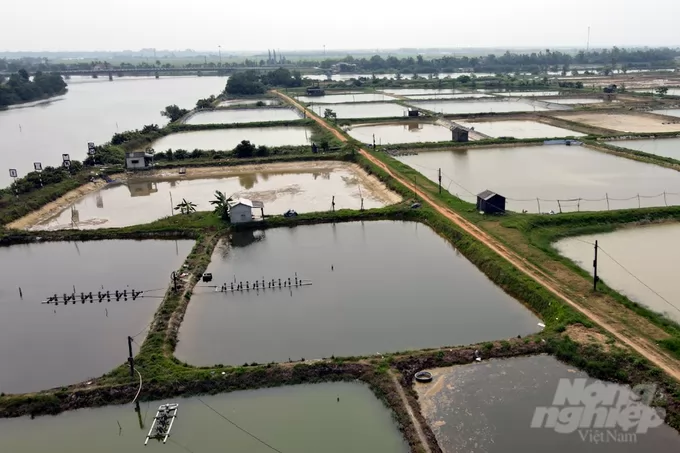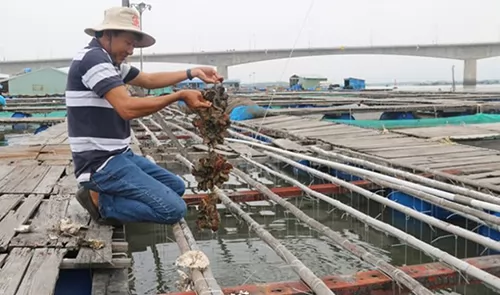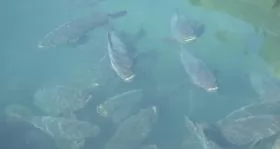Young men launch organic farm after studying in Israel

Drying herbs under the sunshine at the Moshave Farm. — VNA/VNS Photo Thanh Vân
KHÁNH HÒA — Three years ago, the sugarcane growing area in Ninh Hòa Town, the south-central province of Khánh Hòa, was a barren land lot.
Now, it is covered with green space of orchards and medicinal plants thanks to the organic farming model developed by a group of young men.
The four young men, coming from different areas and with little farming experience, chose Ninh Hòa to start up the organic farm after training in Israel, the world’s leading country in agricultural technology and exporter of farm produce.
Nguyễn Tá Đông, 31 years old, hailing from Đắk Lắk Province, leader of the group, studied logistics while Nguyễn Mạnh Tiến, 26, studied marketing; Trương Hoàng Nam, 26, learned food technology and Phạm Minh Thông, 25, majored in economics.
These different backgrounds are also advantages for the group because operating a high-tech organic and large-scale farm requires knowledge in various fields.
Thanks to the knowledge and experience of the operators, Moshave Farm has orchards on 56ha with different kinds of fruits such as coconuts, pomelos, guavas, grapes, jackfruits, mangos and plants for herbal medicine as well as bred chickens and sheep.
The short-term organic herbs are harvested to make herbal products such as hand sanitiser, cleaning liquids, cold-dried ginger powder, pennywort powder, peppermint oil, mineral mud mask and butterfly pea tea.
The farm's products have been distributed to more than 100 retail and wholesale channels nationwide and received positive feedback from customers.
The farm has received capital of VNĐ24 billion from investors and attracted hundreds of trainees.
Behind Moshave Farm’s success are the inspiring stories of the four founders.
Nguyễn Tá Đông, the team’s leader, left the city to work at a farm in the rural area, hoping to build an organic farm combined with ecotourism.
After earning his logistics degree, Đông was in charge of farm produce records at an import-export company and realised the value of Vietnamese farm produce was too low compared to the farmers’ efforts, so he went to Israel to learn about farming.
"The harsh studying time in Israel helped me absorb effective professional working methods. These practical experiences have given me the mindset about high-quality organic agriculture," Đông said.
Returning to Việt Nam after a year in Israel, Đông met three other young men who shared the dream of developing an organic farming model and had also studied in Israel.
“Israel is different from Việt Nam in soil and climate conditions so we had to select suitable methods that we learned in Israel to apply in Việt Nam instead of copying 100 per cent of Israeli models,” he said.
Starting up on a 10ha land lot bought from local people, the team made short-term profits to feed long-term plans.
“In the first days, the profits collected from products were the main income of the farm to pay wages for workers and maintain operations,” Đông told the Vietnam News Agency.
Nguyễn Mạnh Tiến, one of Moshave Farm’s founders, said: “I was quite shocked on the first days in Israel due to their high working intensity in hot weather conditions. The traineeship time helped me learn from the mindset and working spirit of the Jewish people.”
“Israeli people working on the farm do not have the mindset of farmers but the mindset of businessmen in the agricultural sector. They grow plants, at the same time, find the output for their farm produce so they can sell a lot,” Tiến said.
Moshave Farm also promotes communications to let customers know about the farming process while fruits and vegetables are still being grown.
The founders of the farm said getting customers involved in the production chain would urge producers to be more responsible for their products and ensure the rights of customers.
The farm saves operation costs by dividing plants into different zones marked with numbers to manage them on the computer and uses automatic drip irrigation, mist spraying and automatic organic fertilising.
Farmers submit daily, weekly and monthly reports on the management software.
The farm has 30 farmers and officers working on the 56ha, but with traditional methods, up to 60 people would be needed.
Nguyễn Mai Hùng, a worker of the farm, said: “We don’t use pesticides but make organic compost and water the land. The barren land on which local people grew sugarcane and used pesticides has become gradually chemical-free. Farmers working here also have stable incomes.”
Moshave Farm’s founders said they wanted the farm to be not only an organic model but also a community project which offers stable jobs to local people.
The team has shared start-up experience including both successes and failures with local young people.
Nguyễn Trần Ngọc Hòa, secretary of Ninh Thượng Youth Union, said the farm created many job opportunities for people inside and outside the commune and given young people motivation that they too can start a business. — VNS
Maybe you are interested

High-tech and climate resilience shrimp farming
High-tech shrimp farming continues to grow, whereas traditional shrimp farmers suffer losses due to climate change and environmental pollution.

Take samples for testing for disease on mollusks once a month
(VAN) Diseases caused by Perkinsus parasites are closely monitored in Quang Ninh under the recommendations of the World Organization for Animal Health.

Bà Rịa – Vũng Tàu farmers breed Pacific oysters
Many farmers in the southern province of Bà Rịa – Vũng Tàu are breeding Pacific oysters since they have a high survival rate and steady demand in the market.





